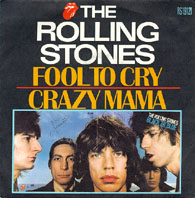| "Fool to Cry" | ||||
|---|---|---|---|---|
 | ||||
| Single by The Rolling Stones | ||||
| from the album Black and Blue | ||||
| B-side |
| |||
| Released | 16 April 1976 [1] | |||
| Studio | Musicland, Munich, Germany | |||
| Genre | Soul [2] | |||
| Length | 4:08 (single edit) 5:04 (album version) | |||
| Label | Rolling Stones | |||
| Songwriter | Jagger/Richards | |||
| Producer | The Glimmer Twins | |||
| The Rolling Stones singles chronology | ||||
| ||||
| Official video | ||||
| "Fool to Cry" on YouTube | ||||
"Fool to Cry" is a ballad [2] by English rock band the Rolling Stones from their 1976 album Black and Blue .
Contents
The song was written by Mick Jagger and Keith Richards. Mick Taylor had just left the band and the Stones were left without a lead guitarist. The recording of Black and Blue acted as a sort of audition for new guitarists, which led to session man Wayne Perkins playing guitar on this track.[ citation needed ] Jagger plays electric piano and Nicky Hopkins performs acoustic piano on the track, with Hopkins also playing the string synthesizer.
Released as the lead single off Black and Blue in 1976, "Fool to Cry" reached No. 6 on the UK Singles Chart and No. 10 on the U.S. Billboard Hot 100. The full track lasts just over five minutes, whereas the single (as well as edits, this also fades out at the end) lasts just over four minutes.
Cash Box called this "a departure for the Stones," saying that "the beat is relaxed, vocals are laid over a foundation of Fender Rhodes and guitar, all played with funky style" and also praised Jagger's falsetto vocals and Richards' "searing guitar riffs." [3] Record World said that "this ballad rivals 'Angie' in its soul drenching qualities" and noted that there were "superb performances all around." [4]
"Fool to Cry" was the only track from Black and Blue to appear on the Stones' career-spanning greatest hits albums Forty Licks in 2002 and GRRR! in 2012.